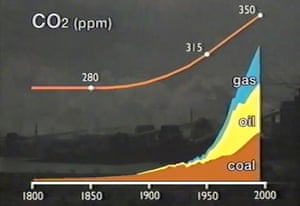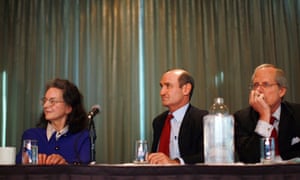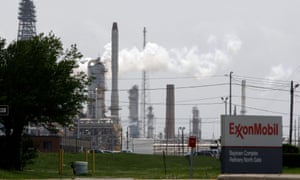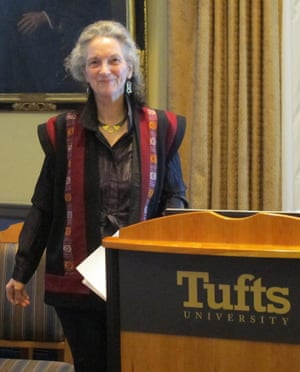Extract from The Guardian
Critics
say public information film shows Shell ‘understood the threat was
dire, potentially existential for civilisation, more than a quarter
of a century ago’
Damian
Carrington and Jelmer Mommers
Tuesday
28 February 2017 16.45 AEDT
Climate
change “at a rate faster than at any time since the end of
the ice age – change too fast perhaps for life to adapt, without
severe dislocation”. That was the startling warning issued by the
oil giant Shell more than a quarter of a century ago.
The
company’s farsighted 1991 film, titled Climate of Concern, set out
with crystal clarity how the world was warming and that serious
consequences could well result.
“Tropical
islands barely afloat even now, first made inhabitable, and then
obliterated beneath the waves … coastal lowlands everywhere
suffering pollution of precious groundwater, on which so much farming
and so many cities depend,” says the film’s narrator, over
disturbing images of people affected by natural disasters and famine.
“In a crowded world subject to such adverse shifts of climate, who
would take care of such greenhouse refugees?”
The
film acknowledged the uncertainties in the computer model predictions
at the time, but noted the various scenarios had “each prompted the
same serious warning, a warning endorsed by a uniquely broad
consensus of scientists in their report to the United Nations at the
end of 1990”.
“What
they foresee is not a steady and even warming overall, but
alterations to the familiar patterns of climate, and the increasing
frequency of abnormal weather,” it cautioned. “It is thought that
warmer seas could make destructive [storm] surges more frequent and
even more ferocious.”
“Whether
or not the threat of global warming proves as grave as the scientists
predict, is it too much to hope as it might act as the stimulus –
the catalyst – to a new era of technical and economic cooperation?”
the film concludes. “Our numbers are many, and infinitely diverse.
But the problems and dilemmas of climatic change concern us all.”
A
family leaves their flooded home in Bangladesh. ‘In a crowded world
subject to adverse shifts of climate, who would take care of such
greenhouse refugees?’ says the film’s narrator. Photograph: Mufti
Munir/AFP/Getty Images
The
film was made for public viewing, particularly in schools and
universities, but is believed to have been unseen for many years. It
was remarkably prescient, according to Prof Tom Wigley, who was head
of the Climate Research Unit at the University of East Anglia when it
helped Shell with the 1991 film.
“It
is amazing it is 25 years ago. Incredible,” he said. “It was
quite comprehensive on what might happen, what the consequences are,
and what we can do about it. I mean, there’s not much more.” He
said the predictions for temperature and sea level rises in the 1991
film were “pretty good compared with current understanding”.
“What
is really striking is nothing has happened [since] to make you doubt
the science as it was stated then,” said Tom Burke, at the green
thinktank E3G and a former member of Shell’s external review
committee.
Shell’s
1991 public information film, Climate of Concern. Photograph: the
Correspondant
But
Shell’s actions on global warming since 1991, such as major
investments in highly polluting tar sands and lobbying against
climate action, have been heavily criticised. In 2015, it was accused
of behaving
like a “psychopath” by the UK’s former climate change
envoy and of being engaged in a cynical attempt to block action on
global warming. Even its own former group managing director, Sir Mark
Moody-Stuart, said in 2015 it was “distressing”
that “remarkably little progress” had been made on
climate change by Shell and other oil companies.
The
revelation of the film,
obtained by the Correspondent, a Dutch online journalism
platform, and shared with the Guardian, has renewed the criticism.
“The
film shows that Shell understood that the threat was dire,
potentially existential for civilisation, more than a quarter of a
century ago,” said Jeremy Leggett, a solar power entrepreneur and
former geologist who had earlier researched shale deposits with Shell
and BP funding.
“I
see to this day how they doggedly argue for rising gas use, decades
into the future, despite the clear evidence that fossil fuels have to
be phased out completely,” he said. “I honestly feel that this
company is guilty of a modern form of crime against humanity. They
will point out that they have behaved no differently than their
peers, BP, Exxon and Chevron. For people like me, of which there are
many, that is no defence.”
Shell’s
1991 film linked fossil fuel burning with rising atmospheric CO2 and
said the “serious warning” of dangerous warming was “endorsed
by a uniquely broad consensus of scientists”. Photograph: Climate
of Concern screengrab
Paul
Spedding, HSBC’s former global head of oil and gas and now at the
thinktank Carbon Tracker, said about half of Shell’s reserve base
is natural gas, the least carbon intensive of the fossil fuels.
“However, its oil portfolio could be a ticking tar-sands time bomb.
Tar sands, which make up nearly 30% of group oil reserves, are
significantly more carbon intensive than conventional oil. As things
stand, Shell’s oil production is destined to become heavier, higher
cost, and higher carbon, hardly a profile that fits the outlook
described in Shell’s video.”
Shell
had, in fact, known of the risks of climate change even earlier. A
“confidential” company report written in 1986, also seen by the
Guardian, noted the significant uncertainties in climate science at
the time but warned of the possibility of “fast and dramatic”
changes that “would impact on the human environment, future living
standards and food supplies, and could have major social, economic,
and political consequences”.
In
1989, Shell had already taken the effects
of climate change into account in the construction of an oil rig.
But in the same year, the so-called Global
Climate Coalition (GCC) was formed by the major oil
companies, including Shell’s US operation Shell Oil. It lobbied
hard to cast doubt on climate science and oppose government action,
and in 1998 Shell
withdrew, citing “irreconcilable” differences.
However,
Shell remained a member of another business lobby group that
campaigned against climate action, the American
Legislative Exchange Council, until 2015 and remains a
member of the Business Roundtable and American Petroleum Institute,
which both fought against Barack Obama’s Clean Power Plan.
The
company has said it has remained a member of groups that hold
different views on climate action to
“influence” them. But Thomas O’Neill, from the group
Influence Map, which tracks lobbying, said: “The trade associations
and industry groups are there to say things the company cannot or
does not want to say. It’s deliberately that way.”
Shell
has also lobbied directly to undermine
European renewable energy targets, a sector it has invested in
although at a much lower level than oil and gas. In 2016, Shell
launched its New Energies division, with annual spending less
than 1% of the total $30bn Shell pumps into oil and gas.
Despite
the company’s public support since the 1990s for carbon taxes to
drive cuts in emissions, in 2015 it
lobbied for exemptions for the electricity it produces and uses,
particularly for its offshore oil and gas platforms.
Some
of Shell’s investments today are also criticised for being
incompatible with the 2C warming target agreed by the world’s
nations. A 2015
Carbon Tracker report concluded the company was planning to
invest more than $75bn in such projects over the following decade,
part of a “carbon bubble” in which reserves are being developed
that cannot be burned if climate change is to be halted – a concern
shared by the Bank
of England and World
Bank.
Another Carbon
Tracker report in 2016 cited a 1998 Shell document showing
the company was aware of this risk. “Shell knew about, but did not
act on, the risks of a carbon bubble,” the report said. “Looking
back over the last 20 years, it seems like Shell has gone backwards
in terms of transparency, and is still recycling the same old green
initiatives, and attempting to deflect responsibility in the face of
an existential threat to its business.”
Shell
was one of the first major oil companies to acknowledge the need to
act on climate change and has long argued that providing affordable
energy was vital for the world and its development. The 1991 film
anticipated the problem: “How could [developing] countries continue
to advance but leapfrog the energy-intensive face of development, by
which other nations prospered before its adverse consequences came to
light?”
But
in 2015
its own external review committee concluded Shell’s
sustainability report did not “adequately convey the urgency of
this [low-carbon energy] transition”. Earlier in February, Shell’s
CEO Ben van Beurden said: “We believe that climate change is real
and we believe that action will be needed.”
Moody-Stuart,
who was also chairman of Shell from 1998-2002, told the Guardian the
broad criticism of the company was unfair. “I don’t think enough
has been done, but I wouldn’t single out the oil industry.
Governments and others have some responsibility and Shell and others
have called for a price on carbon since the 1990s.”
“It
hasn’t got very far at all but that is not Shell’s fault,” he
said. “It is pretty unique for an industry to be actually asking
for something which will increase the price of their product, but
they are asking for it because that is what is needed to drive the
industry in the right direction.”
Burke,
a former head of Friends of the Earth, agreed there is a wider
problem. “It is too easy to blame it all on Shell for getting it
wrong”, he said, as there has been “a broader societal failure”.
Shell’s
1986 report said the climate change problem was one that “ultimately
only governments can tackle”. But it also noted, over three decades
ago, that the energy industry “has very strong interests at stake
and much expertise to contribute. It also has its own reputation to
consider, there being much potential for public anxiety and pressure
group activity.”








